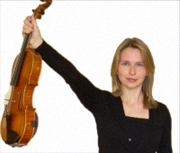Tutor HuntResources Violin Resources
Music, A Must For A Well-rounded Education
Find out why should our children learn music
Date : 18/03/2012
Author Information

Uploaded by : Luisa
Uploaded on : 18/03/2012
Subject : Violin
There is a countless number of benefits in learning music. Many of them have been scientifically proven. Music learning covers many physical and psychical assets: Brain development Learning Styles Memory Social Behavior
Brain Development
Our brain is divided in two sides or hemispheres. This is known as laterality (left and right brain hemispheres). In terms of the brain development of a child in particular, music will have a deep impact in both brain hemispheres:
Information Assimilation and Analysis - Left side of the brain
Rhythm training develops pattern and space recognition and overall general structure. Consequently, music practice can improve orientation and map construction. Music performance encloses physical and mental activity at the same time. Consequently, music training will improve coordination and mind control over body.
Personal and Artistic Development - Right side of the brain
Language and phrasing - music is considered to be an international language where every different sound, pitch, rhythm or accents have multiple meanings. It is well known that children ability to learn new languages is higher and faster than adults`. This is why Suzuki based violin instrumental tuition is so successful. This approach is often called Mother Tongue Music Education where parents broadly support and take part in the child`s music training from an early age. Creativity - musical improvisation. When we speak we are constantly creating/improvising new sentences, dialogues and sometimes, even monologues. Music is exactly the same, once you know how the language works it is a great feeling to just say what you want or to speak to someone. Feelings, sensibility - Harmony more than anything else has the power to evoke or make you remember different feelings. A musician, just like an actor can have plenty of fun disguising them as anything that the music may suggest, even abstract things and emotions. In this respect, music can provide experiences that may help in the process of character development. Expressing yourself as an individual throughout music and exploring different musical characters is definitely enriching.
Learning Styles Music will have a big impact as it encloses them all: Auditory - what we hear. Musical Ear training. Kinesthetic - associated with physical movements such as playing an instrument Visual - what we see. It can be used as a great support in learning how to play an instrument and developing overall musicianship (copycat games and human book secret codes or notation).
Memory
Memory is stored in the cerebellum and it is associated and matches with all learning styles. Learning how to play by heart a song is a great training for your memory and if practiced continuously can lead to great academic results apart from an extended music repertoire.
Music benefits in health are sometimes underestimated. A new study suggests that patients with Alzheimer`s disease could slow the relentless course of the disease by listening to their favorite songs.
Social Behavior
Playing music in a group lessons or in an ensemble is a fantastic way of learning how to be part of a team, how to work hard to get instantly audible results and enjoy the satisfaction of a successful performance. Feeling of goals achievement will develop a strong self-confidence and esteem towards yourself and your team members. Achieving a correct balance between yourself and the group can be a healthy challenge for some shy or over-extroverted children.
Music can causes curiosity and interest for the unknown. Most of students love to investigate how to produce different sounds and combine them to create something new, something theirs. This will of discovering will engage the student and make him/her find the best out of themselves.
Music is highlighting. The most ancient cultures have used music for religious, spiritual meditation and even magic. Music is definitely an important part of each one of us and of our many different cultures and traditions. In that sense it can link us with our past and our future.
Conclusion
I cannot think of any other activity apart from music that stimulates so many different parts of our body and brain at the same time!
Furthermore, professional or amateur, music is an activity that can be enjoyed during all the stages of our life and at any level. How sad would be a life without music? The sooner we start the better we get but it is never too late to start taking part of it.
Everybody can do it, no matter what you have been told. It is in human nature, we walk, we breath, our heart beats and that`s it. We talk and communicate with sounds everyday and that is all we need to make music happen. Starting from ourselves and our voices and finishing with any external instrument as another tool to develop and enjoy our musicality.
This resource was uploaded by: Luisa
